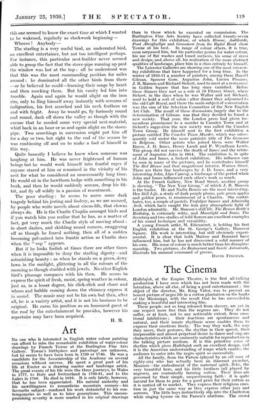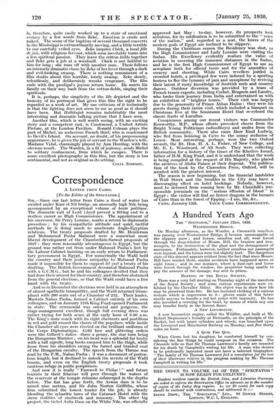The Cinema
Hallelujah, at the Empire Theatre, is the first all-talking production I have seen which has not been made with the intention, above all else, of being a good entertainment ; the object of the director, Mr. King Vidor, was to present an honeit picture of negro life in a cotton plantation on the banks of the Mississippi, with the result that he has succeeded in making a beautiful and interesting film.
These people, not so long released from slavery, are yet in one respect more free than the negroes are. They do not suffer, or at least, not to any noticeable extent, from emo- tional inhibitions ; their reactions are spontaneous and natural, and their innate rhythmic sense enables them to express their emotions freely. The way they walk, the way they move, their gestures, the rhythm in their speech, their irrepressible and almost perpetual desire to dance and sing, are characteristics which are eminently suitable for reproduction in the talking picture medium. It is this primitive sense of rhythm which gives Hallelujah such an excellent design, and it is the American understanding of tempo which enables the audience to enter into the negro spirit so successfully.
All the family, from the Parson (played by an old man of eighty-six) who has actually been an itinerant preacher, Mammie—the, embodiment of the maternal spirit, Zeke, the very beautiful hero, and his little brothers (all played by negroes), are contentedly farming cotton. Their lives are governed by their simple, unquestioning faith : it is quite natural for them to pray for a good price for their cotton as it is carried off to market. They express their religious emo- tion in just the same way as 'they express other joys and sorrows. The little boys instinctively slip into the Charleston while singing hymns on the Parson's platform. The crowd
is, therefore, quite easily worked up to a state of emotional ecstasy by a few words from Zeke. Emotion is crude and naked. The scene of the baptism of several thousand converts in the Mississippi is extraordinarily moving, and a little terrible to our carefully veiled eyes. Zeke inspires Chick, a local fille de joie, with religious fervour, which soon inevitably turns into a less spiritual passion. They leave the cotton fields together and Zeke gets a job at a woodmill. Chick is not faithful to him for long ; she runs off with another man. There follows an intensely dramatic chase by Zeke of her lover through a dark and evil-looking, swamp. There is nothing reminiscent of a film studio about this horrible, lonely swamp. Zeke slowly, relentlessly, and deliberately wreaks vengeance. The film ends with the prodigal's joyous return home. He meets his family on their way back from the cotton-fields, singing their spirituals. It is, perhaps, the simplicity of the life depicted and the honesty of its portrayal that gives this film the right to be regarded as a work of art. My one criticism of it technically is that the lighting does not seem to me as good as it should have been. But Hallelujah remains indubitably the most interesting and dramatic talking picture that I have seen. Another film, which is well worth seeing, with an exciting story and a competent cast, is Condemned, a United Artists Picture, at the London Pavilion. Ronald Colman plays the part of Michel, an audacious French thief, who is condemned to Devil's Island. On account, no doubt, of his prepossessing appearance, he is given the job of servant to the Warden's wife, Madame Vidal, charmingly played by Ann Harding, with the obvious result. The Warden, in a fit of jealousy, sends Michel to solitary confinement, from which he escapes. There is some excellent photography in this film, but the story is too sentimental, and not as original as its setting.
CELIA SIBIPSON.







































 Previous page
Previous page